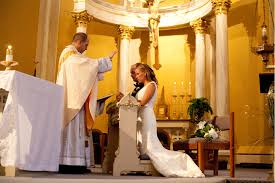 Full Question
Full Question
If a person is infertile through no fault of his own, can he get married in the Catholic Church?
Answer
You may be confusing infertility with impotence. Infertility (the inability to procreate children) is not an impediment to marriage; permanent and irreversible impotence (the inability to consummate a marriage through marital relations) is an impediment. Impotence that is known at the time of the marriage to be permanent and irreversible is a barrier to marriage, because the couple must be capable of consummating their marriage. If the couple has reason to assume that the impotence can be treated or reversed, they may get married.Full Question
Are children of an annulled marriage considered illegitimate?Answer
In his book Annulments and the Catholic Church, canon lawyer Edward Peters explains:The granting of an annulment does nothing to affect the legitimacy of children. That status, to the scant degree it has any canonical significance, is determined prior to the time any questions of annulment are raised (117–19).
Full Question
Are non-Catholic marriages valid in the eyes of the Catholic Church? What if a Catholic marries a non-Catholic?Answer
In general, marriages between non-Catholics, of whatever religion, are considered valid, but the situation is not as simple as it sounds because there are two kinds of marriage: natural (ordinary) marriage and supernatural (sacramental) marriage. Supernatural marriages exist only between baptized people, so marriages between two Jews or two Muslims are only natural marriages. Assuming no impediments, marriages between Jews or Muslims would be valid natural marriages. Marriages between two Protestants or two Eastern Orthodox also would be valid, presuming no impediments, but these would be supernatural (sacramental) marriages and thus indissoluble.When one spouse is a Catholic and the other is a non-Catholic--this is commonly termed a "mixed marriage"--the situation changes. Just as the state has the power to regulate marriages of its citizens by requiring them to get a blood test or to marry in front of a competent authority, so the Church has the right to regulate the marriages of its "citizens."
If one participant is a Catholic who has not left the Church by a formal act, such as by officially joining another church, he must obtain a dispensation for the marriage, which would otherwise be blocked by the mixed-marriage impediment or by the disparity of cult impediment. A Catholic who has not left the Church by a formal act also must obtain a dispensation to be married in front of a non-Catholic minister. If either of these dispensations is not obtained, the marriage will be invalid.